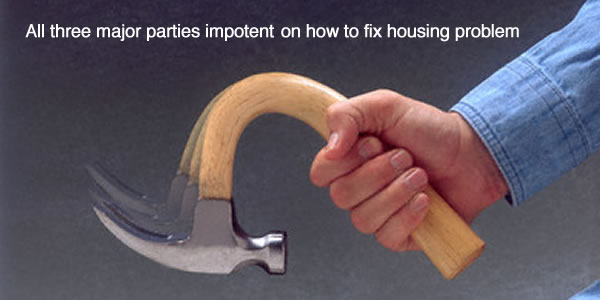The Reserve Bank has reopened the debate on the housing crisis, and the responses from all three major parties have been notable for their impotency. Andrew Little appears to have ditched Labour’s brave but ultimately flawed capital gains tax, and joined John Key in the spineless political ‘centre’, where they do nothing and hope the Reserve Bank can pick up the pieces. They can’t. Only the Greens have stuck to their guns on the capital gains tax, an idea that was so full of holes and exemptions, they might as well join Key and Little in doing nothing.
John Key sits on his hands instead of steering the ship
During the last election John Key pointed out that a capital gains tax only makes sense if it includes owner occupied housing. This was in effect what the Reserve Bank, ourselves and scores of economists have been saying: that we need to close the loopholes in our tax system, particularly around land and housing. What John Key didn’t say, but might as well have, was that taxing owner occupied housing was a political death wish, so he wouldn’t touch it with a ten-foot barge pole.
And so although tax policy is the most potent tool we have, the one that the experts are suggesting would make the biggest difference, it’s given the flick for the sake of political expediency. That’s populist leadership for you.
Andrew Little is snuggling up next to him in the ‘centre’
It seems that Labour have all but abandoned their ill-fated capital gains tax. While the policy was a dog (more on this below) it was at least an admission that there is a problem with the tax treatment of housing. Now Little has retreated to the relatively safe ground of calling for tougher rules around those that own multiple homes. As the Reserve Bank is pointing out, this is merely abdicating responsibility for an issue, and passing the hot potato to them to sort out.
No doubt that there is an argument for investors to have tougher lending criteria than owner-occupiers. That is why most banks already have these sorts of policies in place voluntarily, and why the Reserve Bank is consulting on some rules around the issue. But it won’t be enough to solve the problem, otherwise the Reserve Bank wouldn’t be talking about the need for tax reform. After all, with the housing bubble the way it is, many investors have plenty of equity stored up for more loans. Besides, they will always find ways around restrictions, such as using companies and trusts to disguise how many houses they own, or putting some in the name of their wives and children, or perhaps by not tenanting them at all and claiming the house is for personal use.
Leaving the Greens bravely advocating a pointless policy
Which leaves only the Green Party acknowledging that the tax system contributes to the housing bubble. Sadly their policy (as Labour’s was) is a dog, so full of exemptions and complications to render it pointless. For starters, capital gains are only part of the tax concessions for housing, which is why our proposed Comprehensive Capital Income Tax (CCIT) is a superior approach. A capital gains tax also discourages sales of houses and businesses, is complex to administer and is too volatile in its tax collect. Better to just have the steady CCIT where property owners have the largest portion of the effective income (the rent they don’t have to pay) subject to tax just like any tenant.
Although investors and speculators may be driving up house prices at the margin, the biggest demand for houses still comes from the owner occupier. So why exempt this group from a tax on the benefit they get from their investment? It merely distorts the market and creates the largest single loophole in our tax regime.
What can be done?
One way to overcome this political trepidation would be for tax design to be managed by an independent authority, much as the Reserve Bank manages interest rates now. Under this approach the politicians would simply decide the amount of tax they want to collect, and let experts design the tax system accordingly, rather than contaminate system design with their political priorities. That would be more effective than reviewing the tax system every few years, and then ignoring whatever the experts recommend. In short, politicians simply are not sufficiently competent to be responsible for tax design. Exactly like they are not to be trusted managing monetary policy. We need to take them out of the game – set the macro targets for sure, but thereafter, bugger off.
The Reserve Bank is late to the party, but right
The Reserve Bank is right – late, very late on this – but right. These changes should have been done before Brash, before Bollard – that means over 25 years ago. These problems caused by tax loopholes and favouring of mortgage lending just continue to build a massive misallocation of capital in NZ, endlessly undermining growth and exacerbating inequality.
Tony Alexander has claimed that this is the worst possible time to tax housing, as house prices are so high it could send them crashing and risk destabilising the banking system. Has there ever been a more nakedly self-interested claim made by a bank’s so-called economist? It is a bit like saying to the drug addict – “Sorry, we won’t bother rehabilitating you, you’re so hooked you might find the withdrawal a bit rough. Here, have another syringe.”
The longer we wait, the harder this will be to sort out. Where will the political leadership come from?

